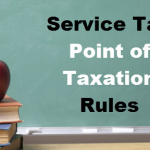-
 23
23
Mar RECENT AMENDMENTS IN SERVICE TAX PROVISIONS- (Category: Service Tax)
Service tax was introduced by the present Prime Minister in 1994 when he was the Finance Minister. The Lok Sabha passed the Finance Bill 1994 on 6th May 1994. The Finance bill 2012 was passed by the Lok Sabha on 8th May 2012. So the Service tax provisions have crossed the age of 18 on 6th May 2012. So Service tax has become a major. Since it has passed the stage of minor, major changes have been proposed in the Service tax provisions. The entire service tax provisions have been re-written by the Finance Act, 2012. The Finance Bill, 2012 has received the assent of the President on 28th May 2012.
Usually in the case of the advocates the senior members are called senior counsel or senior advocate. Even in our profession, we call senior member. But in the case of the service tax provisions this senior and junior differences are lost. This is due to the constant changes that are happening in this area of taxation of services. No one can be called as a learned advocate or learned chartered accountant. Everyone can be a learning advocate or chartered accountant.
Often new circulars and notifications are issued. So it is a continuing learning process. In case of the service tax provisions, one has to unlearn what is stated from 1994 and relearn the new system of taxation based negative list of taxation introduced by the Finance Act, 2012.
Till now finance act remains as a part of Finance Act, 1994. In my opinion this is the right time for the government to make a separate act for service tax provisions. Since the entire system of taxation of services is changed, the government must have used this opportunity to create a separate legislation for the service tax.
Since the topic given to me is RECENT AMENDMENTS IN SERVICE TAX PROVISIONS, I shall mainly deal with the changes effected by the Finance Act, 2012. I shall also deal with the notifications issued for the implementation of service tax based on negative list.
NEGATIVE LIST:
In life we want everything positive. We want positive attitude, positive thinking, positive bank balance etc., But when it comes to service tax under the new provisions, we want to come within the negative list. What is the reason? This is due to the charging section 66B in the Finance Act, 1994. Section 66B reads as under:
“There shall be levied a tax (hereinafter referred to as the service tax) at the rate of twelve per cent on the value of all services, other than those services specified in the negative list, …..”
Services specified in the negative list will not come within the ambit of service tax. There is a definition for negative list. Clause (34) of section 65B defines, “negative list” means the services which are listed in section 66D. There are 17 services listed in section 66D.
When we are asked to take a bitter medicine, we are given sugar after taking the bitter medicine. But I shall first give the sweet amendments proposed in the finance act and then let me deal with the bitter portion.SPECIAL AUDIT:
A new section 72A has been introduced, providing for special audit. This is an opportunity for the Chartered Accountants. But the cost accountants are also given the powers to carry out the special audit. The special audit can be ordered by the commissioner of central excise. At first this may seem to be an opportunity. But this is only fine tuning to suit the needs of the department. In the Finance Act, 1994, we have section 83. This section provides for the application of various provisions of the central excise act, to the service tax legislation also. In central excise act, Section 14A and 14AA provide for the Special audit. But only Section 14AA was made applicable to the provisions of service tax legal provisions. But this section mainly deals with a case where the CENVAT credit utilised is not within the normal limits. So to provide for a comprehensive audit with particular reference to the service tax requirements only the new section 72A has been introduced.
What are the circumstances in which a special audit can be ordered by the Commissioner?
There are three circumstances in which a special audit can be ordered by the Commissioner.
1.When the assessee has failed to declare or determine the value of a taxable service correctly
2.When assessee has availed and utilised CENVAT credit, and such
a.utilisation is not within the normal limits having regard to the nature of taxable serviceprovided, the extent of capital goods used or the type of inputs or input services used
b.CENVAT credit is availed by means of fraud, collusion, or any wilful misstatement or suppression of facts
3.When the assessee has operations spread out in multiple locations and it is not possible or practicable to obtain a true and complete picture of his accounts from the registered premises falling under the jurisdiction of the said Commissioner.
The special audit shall be for the period specified by the commissioner. The chartered accountant or cost accountant shall submit a report within the period specified by the commissioner. When the report of the special audit is going to be used against the assessee, he must be given an opportunity of being heard. This is in tune with the principles of natural justice.LIMITED AMNESTY FROM PENAL PROVISIONS IN THE CASE OF RENTING OF IMMOVABLE PROPERTY SERVICES:
Service tax was imposed on renting of immovable properties by Finance Act, 2007 with effect from 1-6-2007. The validity of service tax on the renting of immovable property has been challenged right from its inception. First there was Delhi High Court decision in the case of Home Solutions Retail India Ltd Vs. Union of India reported in 14 STR 433. This decision was mainly based on the use of the words, when it was originally enacted. At that time clause (zzzz) to section 65 used the words, Taxable service means any service provided or to be provided, “to any person, by any other person in relation to renting of immovable property for use in the course or furtherance of business or commerce”. Before the High court much reliance was placed on the words, “in relation to”. It was argued that renting itself will not constitute an activity liable for service tax. Only an activity done in relation of renting of immovable property will be considered as service. The High court concluded “we hold that Section 65(105)(zzzz) does not in terms entail that the renting out of immovable property for use in the course or furtherance of business of commerce would by itself constitute a taxable service and be exigible to service tax under the said Act”
But the government noting this line of argument, changed the wordings of as follows:
Taxable service means any service provided or to be provided, “to any person, by any other person by renting of immovable property or any other service in relating to such renting, for use in the course or furtherance of business or commerce”.
The controversial words, “in relation to” as changed as “by”. This amendment was made retrospective from 1-6-2007. That is from the day of introduction of service tax of rent from commercial properties. This was again challenged before the Delhi HIgh court in the case of Home Solutions Retails (India) Ltd Vs. Union of India reported in 24 STR 129. This is a decision by a larger bench comprising of three judges. In this judgement, the constitutional validity of the renting of immovable property was upheld. The retrospective amendment was also upheld in favour of the department. When passing this judgment, the court observed, “On the question of penalty due to non-payment of tax, it is open to the government to examine whether any waiver or exemption can be granted.
In tune with this observation, sub-section (2) has been introduced to the Section 80 of Finance Act, 1994. Section 80 provides for the non-levy of penalty, if the assessee proves that there was reasonable cause for the said failure. Earlier there was no sub-section for section 80. It is just a general section. But the new sub-section 2 provides for the exemption for penalty in case of rental income from immovable property services. To avail this exemption the following conditions should be satisfied.
About thr author : admin


